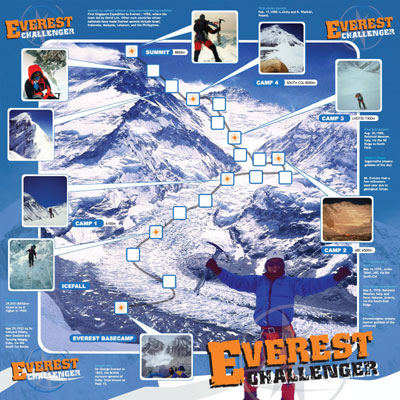The world’s first table-top leadership and teambuilding simulation of climbing Mount Everest.

Everest Challenger® — Climb Your Everest!
A careful balance between the strategy and challenges of an Mt. Everest expedition, and playability, the game is designed to be played by groups between five and thirty persons. Up to seven persons form “expedition teams” attempting to climb Mt. Everest. Outcomes include:
- Planning, and execution with limited resources
- Intra and inter-team trust building skills
- Improving collaborative behaviours and inclinations
- Improving teamwork
- Learning to step-up and take leadership roles
Check out the 2-3 minute video here
Can anyone play Everest Challenger®?
Everest Challenger® is a corporate learning tool that can be incorporated as a day teambuilding segment into a longer programme, or as a stand-alone programme. It is suited to be delivered by:
- workshop leaders / trainers
- HR professionals
- facilitators
- change management consultants
- xperiential learning practitioners
The teambuilding simulation comes complete with dice, various resource cards, a facilitator manual, participant rules and guidelines, a DVD illustrating the challenges and tactics of climbing Mt. Everest using authentic footage from expeditions, and a CD containing sample presentation slides — everything you will need to deliver this at your next in-house leadership or team retreat, or as a solution for a client. Additional items planned include added-value upgrades in the future.
See sample lower-resolution video from DVD | See video clips of teams in action
Who has used Everest Challenger® in the past?
Everest Challenger® has been used by teams from Singapore Management University, and Republic Polytechnic, and multinationals such as UBS, Wella, Bunge, Chartis, and International Flavors and Fragrances (IFF).
Licenses have been bought by organisations in 13 countries Asia, Africa, Europe,Australia and the USA such as:
- FEDEX’s Global Leadership Institute (USA licensee)
- Terry College of Business — University of Georgia (USA licensee)
- Taiwan Sports University ( Taiwan licensee)
- Duncan Chessell (Australian licensee)
- Blue Peaks Consulting (South African licensee)
- Boys Scouts of America (annual national leadership conferences)
- KwaZulu Natal University (South African licensee)
- Hundred Camps Pvt Ltd/Technodent (Indian licensee)
- Opportunity Associates ( Romania Licensee)
- Exploratist (Romania licensee)
- Business Saga (Romania licensee)
- Wildguanabuana (Egypt licensee)
- Equilibria (UK licensee)
Clients who have used Everest Challenger® include:
- International Flavours and Fragrances (IFF)
- Jones Lang Lasalle
- Lenovo
- Bunge
- Chartis
- UBS
- L’Oreal
- Rane (India)
- Singapore Labour Foundation
- Ministry of Health Holdings
- Changi Airport Emergency Airport Services
Everest Challenger® was introduced to the USA at the Association for Experiential Education (AEE) national conference in Vancouver, Washington. More than 20 workshop leaders, consultants and experiential learning practitioners signed up for this professional development intensive on 9th November. The sessions wrapped up four days of many workshops.
The Everest Challenger® simulation was one of these peer-reviewed workshops that managed to make the final cut for the AEE conference. Four “expedition teams” planned, and climbed Everest over half a day, with one folding partway through, and another deciding to collaborate with another to ensure at least one of the teams reached the top.
Debriefs not only helped us consider adjustments to make it an even a better experience but also to possibly roll out teambuilding variations for middle and high-school.
Everest Challenger® in action






Testimonials
Game based training session is always useful. Insights from facilitator’s perspective was also good.
Very useful. Through group discussion, I realize the importance of teamwork, allocation of task individual inputs.
Very stimulating and engaging!
Very invigorating due to the team decisions to be made and the learning points.
Using a game to arrive at the points to be communicated make it unexpected, less guarded and not a boring lecture.
Yes, simulation for learning — suitable for facilitating learning outcomes
